Walking out to the street to find an empty space where you parked your bike creates a sinking feeling worse than any roller coaster.
Unfortunately, motorcycle theft is an all too common problem, but you can minimize the risk by using motorcycle security devices that better prevent theft at home or on the street or can help you get your bike back if it does get stolen.
Since there are so many different devices out there, I’ve collected the majority of them here so you can create your own comprehensive motorcycle security strategy.
Why Should You Invest in Motorcycle Security Devices?
1. Safeguard Your Investment
Motorcycles aren’t exactly cheap. Whether it’s for transportation or just a hobby, having your bike stolen means you’re losing that whole investment.
With that in mind, the cost of a few anti-theft devices seems small in comparison and a way to save money in the long run.
2. Minimize Hassle and Lost Time
Even if your insurance totally covers your motorcycle in the case of theft, having it stolen is a major hassle.
You’ll waste time filing police reports and dealing with your insurance. Plus, if your bike is your main means of transportation and commuting, you’ll have a tough time getting to work and around town until the claim goes through.
3. Lower Your Insurance Rates
In some cases, installing security devices on your motorcycle will lower your insurance premiums. Usually, they’ll want to see an advanced system like a GPS tracker or integrated alarm system installed by a professional, but it’s worth calling your insurance provider to see what devices they authorize and how they can affect your rates.
Motorcycle Security Options
Here is a roundup of all your motorcycle security options, from the simplest to the highest tech.
We recommend using a combination of these to get the best protection.
Cover
You may think of a cover as a means of protecting your bike from the elements, but it can actually deter thieves as well.
Most motorcycle thieves are lazy, not very bright and impulsive. They just take the path of least resistance. A securely placed cover that’s difficult to take off will be enough of a deterrent to send them looking for lower-hanging fruit.
Moreover, a motorcycle cover prevents a potential thief from knowing the make, model and state of your bike.
Thieves look for bikes that will give them the highest return for the risk of stealing, so while it may not be a fortress, a cover can discourage a thief who may decide to look for a bike they know for sure is worth a lot.
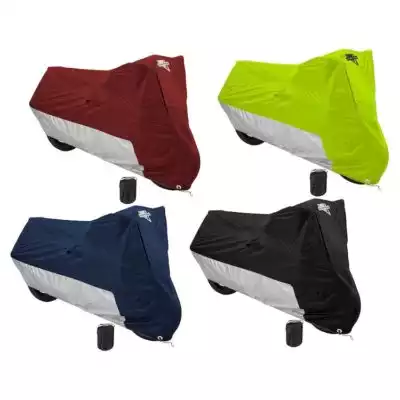 Nelson Rigg Deluxe All Season Cover
Nelson Rigg Deluxe All Season Cover
The water-resistant polyester fabric protects your bikes from the outdoor elements while its universal fit and elastic bottom obscure the make and model of your motorcycle and provide a hassle for would-be thieves.
Alarm System
Alarms have become standard on cars, but they’re much less common on motorcycles. If yours doesn’t have an alarm system, you can easily add one.
Many locks and trackers feature alarms, but there are also stand-alone systems. These usually work by being paired to some kind of remote that you carry on you.
When you ride the motorcycle, the alarm pairs with the remote and knows everything is fine. However, if someone without the remote moves the bike, it knows there’s a problem and sounds the alarm.
Alarms serve two main purposes. First, they let you or others nearby know when someone is trying to steal your bike. You can then notify the police. Second, they scare off thieves who aren’t expecting the alarm, which is usually the case for motorcycles.
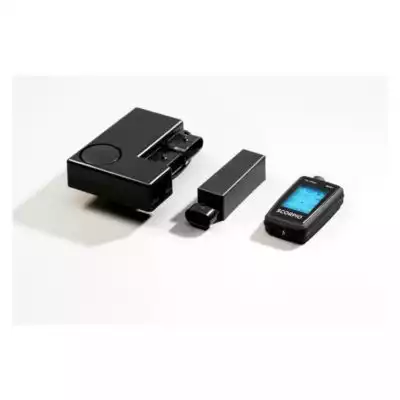 Scorpio SRX-900 Security System
Scorpio SRX-900 Security System
I like this system from Scorpio because it has a loud alarm but uses little electricity so worrying about recharging is less of a problem. Plus, the remote-alarm pairing is autonomic and doesn't require any manual input, which can be a hassle.
Chain Lock
A chain is the most basic but arguably one of the best methods of motorcycle security.
You wrap it through the bike’s frame and then attach it to some kind of secure anchor. This could be a ground anchor you’ve installed in your home, something sturdy on the side of the street, or even a friend’s motorcycle if nothing else is around. Then you lock it with a key or combination.
To steal the bike, a thief would have to cut through the chain or the frame of the motorcycle. Not only would this be time consuming and risky since someone is likely to notice, but it could also damage the motorcycle, defeating the purpose of stealing it.
If the chain cannot reach your motorcycle’s frame and the anchor, you can also loop it through one of the bike’s wheels and the frame, or the wheel and an anchor.
While this accomplishes basically the same thing, it’s worth remembering that a thief could remove the wheel to steal the rest of the bike.
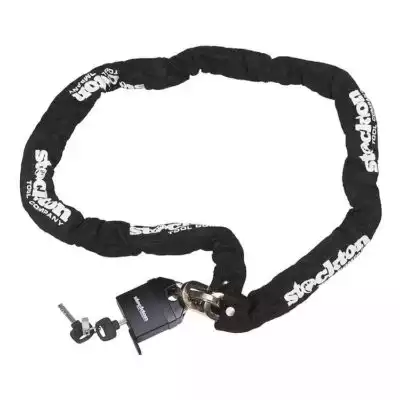 Stockton 721 Security Chain And Lock
Stockton 721 Security Chain And Lock
This is a straight-forward key-lock motorcycle chain that provides the security of 10mm steel at a low price. Additionally, its six feet of length give you flexibility when anchoring it on the street.
Brake Lever Lock
Lever locks aren’t designed primarily for theft prevention. Rather, their main purpose is preventing your bike from rolling while it’s on an incline.
You slip a lever lock onto the front brake lever and handle bars. It holds the lever in an activated position so that the brake is perpetually applied to the front wheel. As a result, the bike can’t roll.
Some lever locks are just clamps and can be taken off without any key or combination. These prevent your bike from rolling but provide little security.
Others can be attached and locked. Although these still aren’t the strongest devices and can be broken if someone really wants to steal your bike, they’re still a good deterrent for an impulsive thief who might otherwise just try to roll your bike away.
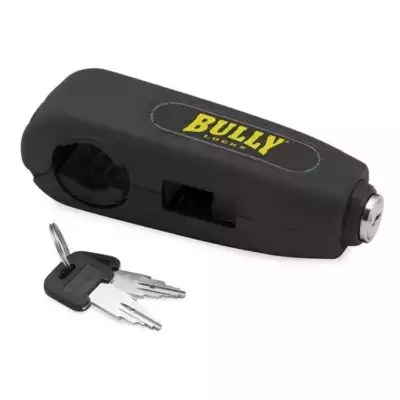 Bully Locks Grip Lock
Bully Locks Grip Lock
With this grip lock, ToolWRX took the simplicity of a lever clamp and added toughness and security for anti-theft protection. It locks with a key and is easy to put on, take off and carry around with the rest of your motorcycle gear.
Disc Lock
Disc locks are one of the more popular security measures because they’re inexpensive but effective and specifically targeted at security.
They attach to the disc of your rear brake right through the holes in the disc itself. This prevents the rear wheel from turning, immobilizing the bike and stopping any thieves looking to ride or wheel off your motorcycle.
Disc locks are generally more secure than lever locks, but the trade-off for the convenience is that really determined and knowledgeable thieves can still pick the lock.
They’re better at deterring the impulsive thief on the street than the professional thief who may visit your neighborhood.
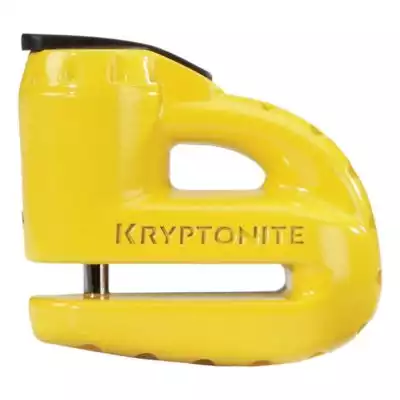 Kryptonite Keeper Disc Lock
Kryptonite Keeper Disc Lock
Since disc locks are convenient ways to add a bit of security when parking your bike on the street, I recommend this one from Kryptonite because it's inexpensive and easy to use. Furthermore, the small 5mm pin fits most motorcycles.
Brake Disc Lock-Alarm Combo
If you’re willing to spend a bit more, getting a disc brake with an integrated alarm adds a bit more security.
The alarm warns you if anyone is trying to steal your motorcycle and in many cases can be sensitive enough to recognize picking attempts, eliminating one of the primary weaknesses of disc locks.
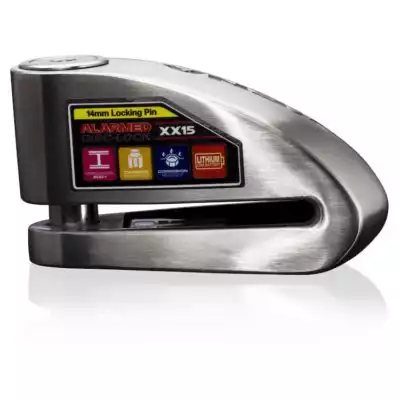 Xena XX15 Disc Lock with Alarm
Xena XX15 Disc Lock with Alarm
This is one of my favorite disc locks on the market, not just because of the loud alarm but also because of the freeze spray-resistant design and anti-pick lock. In other words, you get the convenience of a disc lock with a higher level of security.
U Lock
A U lock functions in essentially the same way as a disc lock. It loops around your rear brake disc so that if the wheel tries the move, the lock knocks against the brake caliper or a wheel spoke, stopping it.
U locks aren’t quite as secure as disc locks because it’s easier to cut through the longer U loop without damaging the wheel. However, they’re more convenient because you can put them on and take them off much faster if you’re in a hurry.
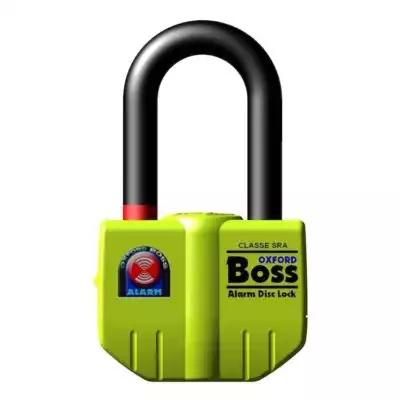 Oxford Boss Alarm Disc Lock
Oxford Boss Alarm Disc Lock
In the case of this Oxford lock, you don't just get a tough lock that's easy to secure. You also get an integrated alarm that's loud enough to warn you of a potential theft.
Ground Anchor
Ground anchors are a method of home security. You install one into the floor of your garage or in your driveway, and then you can attach your motorcycle to it with a chain lock or some other security measure.
Basically, a ground anchor gives you something at home to chain your bike to like you would on the street. This level of security will then depend on how it’s anchored. Some are merely bolted in while others can be cemented in, making them part of the structure of your home.
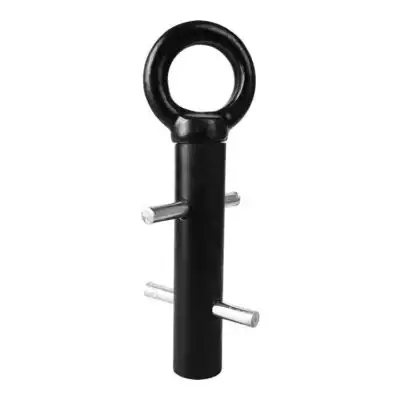 Oxford TerraForce Ground Anchor
Oxford TerraForce Ground Anchor
Though it takes a bit more work, I prefer anchors like this one that can be installed right into the concrete floor of your garage or driveway. This provides an even more secure anchor that you can chain your motorcycle to.
Garage Door Defender
When at home, it’s always a good idea to park your motorcycle in your garage if you have one. Not only is it harder for a thief to get to it, but it hides it away so that an impulsive thief won’t even know you have it.
Still, if a professional thief noticed you riding your new Harley around town, they might just follow it to your garage where it won’t be too hard to break in if they’re really determined. Garage doors aren’t exactly difficult to force open.
A garage door defender involves an anchor drilled or cemented into the ground that attaches to a bracket bolted into the door with a lock. This way, even if a thief is able to get a clothes hanger around the opener carriage, they won’t be able to open the door. And they certainly won’t be able to force it open.
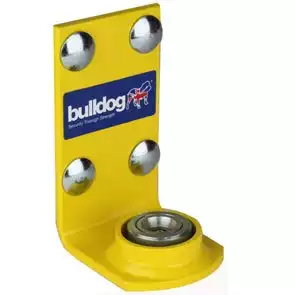 Bulldog Garage Door Lock
Bulldog Garage Door Lock
This lock provides extra security for your garage thanks to a reinforcement plate and an extra-tough steel bolt that's hard for any thief to get through.
GPS Tracker
If your bike does get stolen, a GPS tracker can be a saving grace. It can tell you and the police right where the thieves have taken it, usually via an app that connects to the tracker. The tracker then accesses a GPS system to relay the location to you.
With batteries that can last more than a year, this GPS tracker activates consistently whenever you get off the bike and take the paired keyfob with you. On top of location updates every five minutes, it even calls your phone in under a minute if the motorcycle starts moving without the paired keyfob.
Common Sense
At the end of the day, no number of fancy gadgets can substitute for common sense and reasonable caution when it comes to motorcycle security.
Don’t do silly things like leave your keys in the ignition or park your bike overnight in an area known for motorcycle theft. Try to park in well-lit areas around a lot of people and use monitored garages whenever possible. Lastly, make sure you know your license and VIN number so you can give them to the police if your motorcycle does get stolen.
It’s not hard to outsmart motorcycle thieves if you use your head and practice common-sense motorcycle security. Combined with security devices, you can greatly reduce your chances of theft.